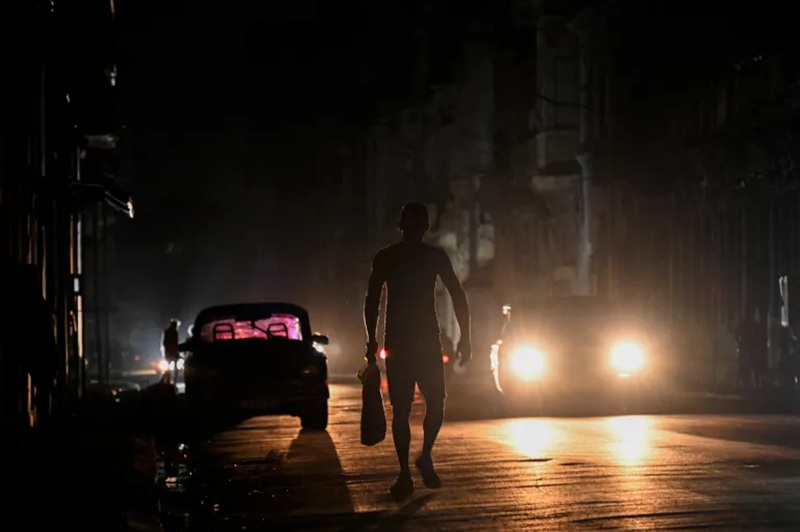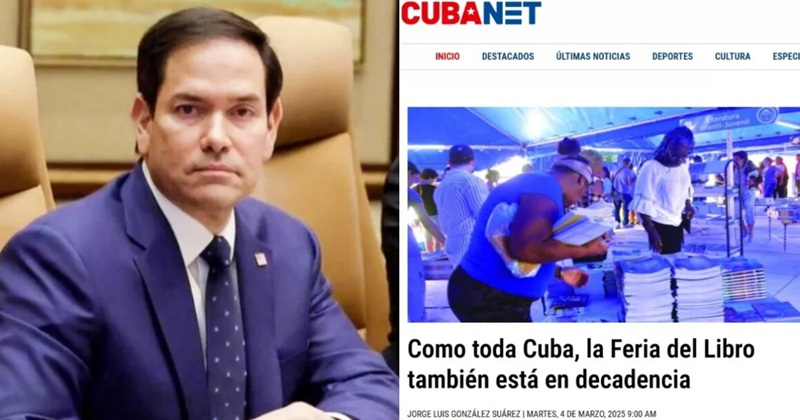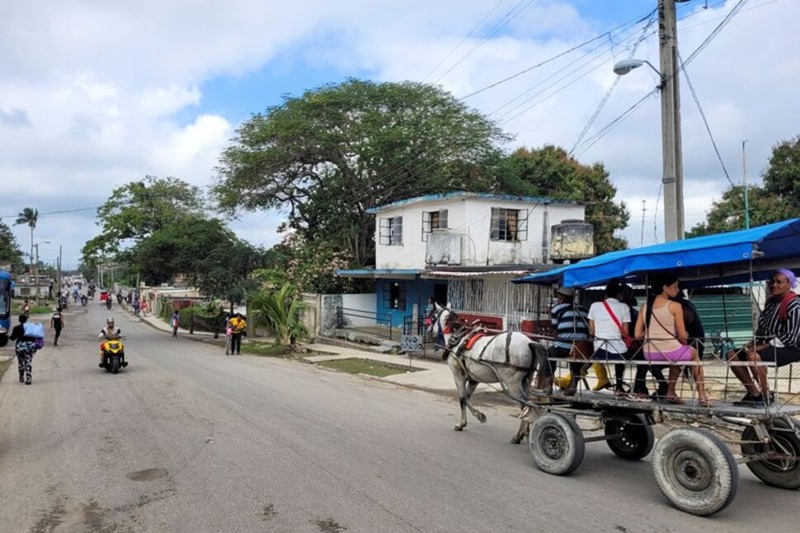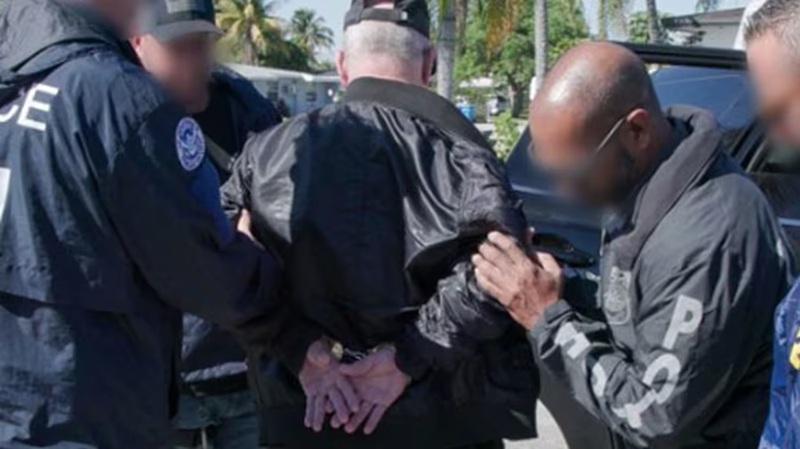Damir Ortiz, a 10-year-old with leukemia and a rare genetic disease that has caused a tumor in his left eye, was medevaced Wednesday from Cuba to the Nicklaus Children’s Hospital in Miami, after overcoming bureaucratic obstacles and the reluctance of the Cuban government. 
From left to right, Florida United States Representatives Mario Díaz-Balart, Maria Elvira Salazar, and Carlos A. Giménez are three Cuban Americans in the U.S. Congress. They will face tough questions from constituents if a new travel ban by the Trump administration for Cuba and Venezuela goes into effect.
Last month, 79-year-old Martha Beatriz Roque, a prominent dissident and former political prisoner, who received the International Women of Courage Award from the U.S. State Department in absentia last year, was finally allowed to come to Miami by Cuban authorities because she needed medical treatment after falling gravely ill.
“Support for the Cuban people” through cooperation in such humanitarian cases has been a central tenet of U.S. policy under several administrations. Under current versions of a Trump administration plan to ban Cubans from entering the United States, people like Ortiz and Roque would have never made it to Miami — likely dying on the Communist-run island.
The immigration restrictions now on the table would impose an absolute ban on entry by Cuba and Venezuelan nationals, regardless of what country the live in, with no exceptions for the elderly, the sick or harassed dissidents, sources familiar with on-going discussions told the Miami Herald — trapping them in dictatorships recently labeled by Secretary of State Marco Rubio, as “enemies of humanity.”
The plan — still being crafted by Stephen Miller, a key advisor to President Donald Trump and architect of his mass deportation plan — would also extend similar but slightly less harsh restrictions on Haitian nationals and, sources say, potentially extend to other Caribbean nations.
Before Trump took office, his team had approached several Caribbean governments to accept undocumented migrants from the U.S. whose nations refused to allow them to be returned. Travel bans on those island nations potentially could be used as bargaining chips in negotiations to accept deportees.
The extreme travel ban policies emerging from the White House have been largely kept from Congress so far but will likely pose a major dilemma for many South Florida politicians, whose communities have large populations of constituents with deep ties to the targeted countries.
Read More...
Millions of people in Cuba remained without power Saturday after a failure of the nation’s electric grid left the island in the dark the previous night.
The massive blackout is the fourth in the last six months as a severe economic crisis plagues the Caribbean country. The Ministry of Energy and Mines, in a statement on social media, attributed the latest outage to a failure at a substation in the suburbs of Havana, the capital.
Internet and telephone service were intermittent about 18 hours after power went out around 8 p.m. local time Friday.
Lázaro Guerra, director of electricity at the ministry, said on national television that power was already being generated to support vital services such as hospitals.
A statement from the Cuban Electricity Union released Saturday said the strategy was to create “microsystems” that will connect to each other to gradually restore electricity across the country. Several of these were already operating in the provinces of Guantánamo, Santiago, Las Tunas and Pinar del Río.
In Sancti Spíritus, the provincial energy company reported on its Telegram channel that more than 200,000 customers in that area had electricity thanks to these microsystems.
Many Cuban families use electric equipment to prepare their meals. The outage could cause food to thaw in refrigerators and possibly spoil due to the island’s tropical climate.
“When I was about to start cooking and making some spaghetti, the power went out. “And now what?” Cecilia Duquense, a 79-year-old housewife who lives in the working-class neighborhood of Central Havana, said Saturday.
In Havana, people were shopping for food Saturday. Businesses were open, although some were operating using batteries or small home generators.
Gas stations were also open, but the tunnel that runs under Havana Bay and connects the city to the outskirts was dark.
Cuba suffered similar blackouts in October, November and December. The latest was the first of 2025 but in mid-February authorities suspended classes and work activities for two days due to a shortage of electricity generation that exceeded 50% in the country.
Experts have said the electricity disruptions are a result of fuel shortages at power plants and aging infrastructure. Most plants have been in operation for more than 30 years.
The outages come as Cubans are experiencing a severe economic crisis that analysts have blamed on the effects of the COVID-19 pandemic, a program of domestic measures that triggered inflation and, above all, the tightening of sanctions by the United States.
Source: AP News
The U.S. Secretary of State, Marco Rubio, ordered the withdrawal of U.S. government funds from the independent portal CubaNet, as part of the Trump administration's policy to suspend foreign assistance.
The measure represents a significant blow to the work of independent media operating from exile and giving a voice to journalists within Cuba.
In the opinion of Roberto Hechavarría Pilia, director of the news agency, the decision significantly complicates its continuity.
"It will be extremely complicated to maintain our work as it has been conceived until now," he stated to Diario de Cuba, after being informed of the end of the grant by the United States Agency for International Development (USAID).
CubaNet, founded in 1994, is regarded as the pioneer of independent journalism in Cuba and has served as a platform for journalists on the Island, allowing them to expose the reality censored by the regime.
"Our goal has always been to counteract the propaganda of the Castro regime. Without this funding, the government in Havana will have greater freedom to intensify its propaganda and repression," Hechavarría stated.
The cancellation of funds to CubaNet is not an isolated incident. At the end of January, several independent exile media outlets were notified of the temporary suspension of assistance while the U.S. government reviewed its financing of international programs. However, last week, in the case of CubaNet, the suspension became permanent.
According to the received notification, Secretary of State Marco Rubio and Peter W. Marocco, director of the Office of U.S. Foreign Assistance Resources at the State Department and designated deputy administrator of USAID, determined that the funding program for CubaNet "was not in the national interest." As a result, they decided to terminate and rescind it.
For Hechavarría, the most serious consequence of this decision is that CubaNet will be unable to fulfill its mission with the necessary effectiveness.
"What is happening with independent Cuban journalism, civil society, freedom of expression, and the struggle for democracy in Cuba is a step backwards, just as the Castro regime is at its weakest point," he denounced.
Furthermore, he warned about the geopolitical significance of the measure: "Cuba remains a totalitarian regime just 90 miles from the United States, allied with Russia, China, and Iran. Undoubtedly, for Havana, it is good news that efforts to oversee its actions are being reduced."
Source Cibercuba
Cuba's top tribunal said late on Monday 553 prisoners had been released following a deal brokered by the Vatican that seemed in limbo after Donald Trump reversed a Biden administration pledge to ease sanctions on the country.
A general view shows a street of La Guinera neighborhood in Havana, Cuba, January 15, 2025.
Former President Joe Biden in January agreed to remove Cuba from a U.S. terrorism blacklist in exchange for the prisoner release in negotiations with the Catholic Church.
Trump rescinded the Biden deal upon taking office, putting Cuba back on the list, slapping the island with fresh sanctions and prompting its communist-run government to temporarily pause the prisoner release.
But Cuba's state-run media said on the evening TV newscast Monday that judicial officials had confirmed the "early release" of 553 prisoners.
"Authorities of the Supreme People's Court of Cuba affirm that these 553 people are already free and that the process has concluded," the report said.
Rights groups began reporting a fresh trickle of prisoners released from the island's jails last week despite Trump's decision to back out of the Biden deal. The groups, however, said some of those liberated appeared to be common criminals.
The Biden administration had initially said Cuba would release "political prisoners" as part of the broader deal.
But Cuba did not specify, saying it would gradually release "553 people sanctioned for diverse crimes."
The United States, the European Union, the Catholic Church and watchdog groups have long pushed Cuba to release hundreds of protesters jailed following anti-government protests on July 11, 2021, the largest since Fidel Castro's 1959 revolution.
Cuban authorities maintain those it jailed committed crimes ranging from arson to vandalism and sedition.
Watchdog groups said around 200 prisoners tied with protests had been released as of late last week, though they said scarce information made it difficult to be sure.
The Cuban state-run media report on Monday did not specify how many of the 553 prisoners released under the Vatican-brokered deal had been detained in relation to the 2021 protests.
Source USNEWS/Reuters
The U.S. Department of Homeland Security announced Wednesday that a group of federal agents had arrested a man in Broward County who was accused of formerly spying for Cuba.
HSI did not identify the gray-haired man by name. The announcement on X described him as “a former member of Cuban intelligence” who had “fraudulently” obtained his lawful permanent resident status and posed a “threat to national security.”
According to Nestor Yglesias, a Miami-based spokesman for HSI, the arrest was in West Park. Aside from HSI, it also involved agents with the FBI and ICE.
It’s unclear if the man was related in any way to the case of Manuel Rocha, a Colombian-American former U.S. diplomat who was sentenced to 15 years in prison last year for spying for Cuba for decades before an undercover FBI agent caught him in Miami.
In a recorded meeting, Rocha, 73, a former U.S. ambassador to Bolivia also known as Victor Manuel Rocha, referred to the U.S. as the “enemy” and boasted about how he pretended to be a hard-nosed conservative while secretly operating as an ideological spy who admired Fidel Castro.
Source: WPLG Channel 10